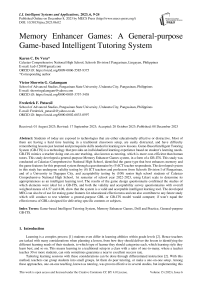Memory Enhancer Games: A General-purpose Game-based Intelligent Tutoring System
Автор: Karen C. De Vera, Victor Sherwin G. Galamgam, Frederick F. Patacsil
Журнал: International Journal of Intelligent Systems and Applications @ijisa
Статья в выпуске: 6 vol.15, 2023 года.
Бесплатный доступ
Students of today are exposed to technologies that are either educationally effective or distractive. Most of them are having a hard time learning in a traditional classroom setup, are easily distracted, and have difficulty remembering lessons just learned and prerequisite skills needed in learning new lessons. Game-Based Intelligent Tutoring System (GB-ITS) is a technology that provides an individualized learning experience based on student’s learning needs. GB-ITS mimics a teacher doing one-on-one teaching, also known as tutoring, which is more cost-efficient than human tutors. This study developed a general-purpose Memory Enhancer Games system, in a form of a GB-ITS. This study was conducted at Calasiao Comprehensive National High School, identified the game type that best enhances memory and the game features for this proposed system through a questionnaire by (9) ICT teacher respondents. The developed system in this study has undergone validity testing by (8) ICT teachers and professors from Schools Division I of Pangasinan, and of a University in Dagupan City, and acceptability testing by (100) senior high school students of Calasiao Comprehensive National High School, 1st semester of school year 2022-2023, using Likert scale to determine its appropriateness as an intelligent learning tool. The results of the game design questionnaire confirmed the studies of which elements were ideal for a GB-ITS, and both the validity and acceptability survey questionnaires with overall weighted means of 4.57 and 4.08, show that the system is a valid and acceptable intelligent learning tool. The developed MEG can also be of use for testing game features for educational effectiveness and can also contribute to any future study which will conduct to test whether a general-purpose GBL or GB-ITS model would compare; if won’t equal the effectiveness of GBLs designed for delivering specific contents or subjects.
Game-based Intelligent Tutoring System, Memory Enhancer Games, Drill and Practice, General-purpose GB-ITS
Короткий адрес: https://sciup.org/15019017
IDR: 15019017 | DOI: 10.5815/ijisa.2023.06.02
Текст научной статьи Memory Enhancer Games: A General-purpose Game-based Intelligent Tutoring System
Learning is a complex process [1] students even differ in learning abilities within grade levels [2]. Hence teachers are tasked with many considerations when planning a lesson, from how they should deliver the lesson to identifying the different learning needs of their students, to which type of learner they should categorize each, which learning style they learn best, and so on. This means learning in a traditional setup in a class with a ratio of one-to-many, where a teacher teaches 30 or more students, can only sometimes guarantee a near to excellent success rate.
A GB-ITS sustains students' engagement through gameplay and adapts to the needs of its players by giving feedback to provide them information on which content knowledge or skill they need to study more and provides teachers data about the needs and achievements of their students [7, 8]. But with all developed GB-ITS, there is still none developed for general use. All developed GBLs and GB-ITS are for learning a specific topic or subject only, but none is developed yet which can be utilized by educators to add or edit their desired lessons or contents and provide assessment in the form of games in a GB-ITS platform. If this is possible, remediation on a one-on-one teaching approach, also known as tutoring will be cheaper with the use of a customizable GB-ITS.
This is what this study sought to address, to develop a general-purpose GB-ITS, initially for ICT-related subjects, given recent data regarding the availability and ratio of computers in public schools, which is only 532,637 compared with the 19.28 million total population of students [9], and based on the 2018 Programme on International Students Assessment (PISA) results [10], where the Philippines ranked last in reading literacy, and second lowest both in Science and Mathematics literacy among 79 countries. Some study shows a common reason for students’ difficulty in Mathematics and Science subjects, including English Phonology [11], is students’ difficulty in remembering, whether it is prerequisite skills or competency, or a topic just discussed a day before a new topic [12-14]. These facts suggest a system that improves memory and will serve as an alternative remediation/learning delivery tool for ICT subjects. The method developed in this study will be implemented in Calasiao Comprehensive National High School, Senior High School, and tested by selected sections of students taking ICT subjects.
The main objective of this study was to develop a Memory Enhancer Game: An Intelligent Learning Tool following the principles of a Game-Based Learning Intelligent Tutoring System.
Specifically, it sought to answer the following:
-
• What type of puzzle game(s) should be adapted in the proposed Memory Enhancer Game for ICT-related subjects?
-
• What are the game features to be adapted in the proposed Memory Enhancer Game for ICT-related subjects in terms of:
-
a. Perspective
-
b. Design
-
c. Rewards and scores
-
d. Player’s Properties
-
• What is the level of validity of the proposed Memory Enhancer Game for ICT-related subjects with regards to:
-
a. design
-
b. accuracy
-
c. navigation and
-
d. usability
-
• What is the level of acceptability of the proposed Memory Enhancer Game for ICT-related subjects of players or students regarding:
a. preference in using Game-based Learning Intelligent Tutoring Systems
b. system’s suggestions and feedback
c. difficulty level of games
d. visual aesthetic design and e. content
2. Background Study
2.1. Development of a Game for Learning2.2. Game Type for Retention of Learning or Remembering
2.3. Game Design for a Game-based – Intelligent Tutoring System
The findings of this study contribute to the development of a possible effective alternative for the remediation and Learning of ICT subjects, as well as a temporary solution for the lack of computers. This can also contribute to any future study to test whether a general-purpose GBL or GB-ITS model would compare; if it will not equal the effectiveness of GBLs designed for delivering specific contents or subjects. Empirical-wise, the resulting system of this study can be used for testing the instructional efficacy of game features that will be adapted in the proposed system.
Commercial games, or digital games, are known for being addictive. Recorded ages involved in this addiction are grade schoolers, middle school, high school students, and adults. The US even recorded an average of 9.5 hours a day commitment to playing digital games, according to Kneer and others (2014), as cited in [15].
So, education enthusiasts found ways to use this popularity of digital games to aid, even to the extent of executing the teaching and learning process itself, without or with minimal teacher intervention, and initiated Game-Based learning.
This is all possible due to the one factor that digital games exhibit: playfulness. Though, not all digital games for learning easily tribe as commercial games do, so researchers studied what elements made digital games addictive and engaging [7]
Along with its motivational effects, GBL has four other benefits [16]: student-centered learning, which enables students to learn at their own pace; social-emotional growth through the development of soft skills, primarily in nondigital games, but not limited to digital games version with group game collaboration features; low-risk competition, where student’s confidence is developed; feedback, where students learn where they still need to improve and did well, and provides teacher records of students’ performance.
The following elements were found to be comparable in different studies, making digital games engaging: controls, aesthetics, challenge, competition, and rewards [18]. Controls pertain to the autonomy of the players to control the possible variety of experiences following a set of game mechanics [7, 19]. Another is Aesthetic design, for it attracts gamers to use games with sophisticated designs, which include the game environment, characters/avatar, the visual design of cues and feedback, and of tools and controls of the game. [7]. The visual design of a digital game could or may not attract players to use it. Keeping the players engaged is another essential element, and so the game Challenge [20, 21] should be effectively designed in a manner that the players do not lose interest in the game because it is too easy, making it boring to play, or too difficult, in a sense that players lose interest due to the loss of control and ability to win a level. Social factors also help in keeping a player engaged in a game. Having a record to beat, achieving higher than peers, and having popularity are reasons social games make the competition a plus. Lastly, winnings, rewards, or tokens make a repetitive game enjoyable, giving players a sense of achievement for having completed a task, or an added tool to complete a level [20], which serves as intrinsic motivation for learners to continue playing [7]. These elements, when combined, having the exact level of difficulty, and embedded with the learning contents, make an educational game effective [22].
According to [7], these are other considerations for designing GBLs game features based on the Value-added research:
-
• Modality – voice dubbing rather than printed text resulted in a median effect size of d = 1.4
-
• Personalization – conversational text rather than a narrative or formal language with a median effect size of
d=1.5.
-
• Pretraining – adding a pregame trial with guiding instruction results in learning improvement equivalent to a median size of d = 0.8 across seven experiments.
-
• Coaching –in-game feedback and advice resulted in a learning improvement of the median effect size of d = 0.7.
-
• Self-explanation – based on 16 experiments, game prompts for explanation or reflection during the game produced a learning improvement of a median effect size of d = 0.5.
-
2.4. Usability and Content Delivery of Game-based Learning Systems
-
2.5. Game-based Intelligent Tutoring System’s Suggestion and Feedback
-
2.6. Preference for Using Game-based Learning Intelligent Tutoring System
The study continues to test other game features for instructional effectiveness, such as competition (showing of ranking of players based on scores), segmenting (creating sections or panels to divide the screen into parts), image (use of digital tutor or agent on screen), narrative them, choice (letting players use tokens as coins for purchasing, and allowing players to go back to previous game levels they have already completed).
Studies included in [7] show GBLs' effectiveness:1. Cognitive consequence – a series of experiments were conducted to test whether there is improvement in the cognitive skills for learning after playing games compared with a controlled game or not playing at all, which resulted in a median effect size of d = 1.2 using action video games, and a median effect size of d = 0.8 based on six experiments using spatial puzzle games. 2. Media comparison research – which compared learning through games and learning through traditional media, which resulted in the consistent advantage of learning through games with a median effect size of d = 0.5 based on six experiments.
There are factors to consider regarding what purpose a GB-ITS would be developed for [22]. According to the studies, there are four (4) significant reasons identified: motivation, preparing the students for the topic; teaching and presenting new knowledge and skills; content mastery, helping master a specific topic or subject contents knowledge and skills; and the acquisition of higher order thinking skills or HOTS. However, you cannot combine all four in single GB-ITS. The focus of this study is to develop a content mastery GBL-ITS applying drill and practice, which some successful studies made use of, namely Funbrain [23], iStart-2 [24], Word Injection [25], Kahoot! [26], and many others initiated an online GBL.
Some even brought GBL to a higher level, adapting to its students' needs, style, and level of learning, and developed the Game-based Intelligent Tutoring System [27-29]. Intelligent Tutoring System was an initiative introduced before GBITS. ITS is a system composed of 4 basic modules, the Domain module, which contains the learning content; the Student module, a data bank about the content knowledge, learning style, and other information about the student; another is the Teacher module, which contains the pedagogies to be used in delivering the content to the student, depending on the collected student data; and the Interface module, which is the most critical module among the four because it serves as a mediator to all the other modules, letting the student interact with the system [5]. However, the problem with ITS is that it cannot maintain students' engagement in prolonged skills or content knowledge acquisition [24], so the synergy of Game-Based Learning and ITS was introduced. A GB-ITS not only sustains students' engagement through gameplay, but it adapts to the needs of its players by giving feedback to provide them information on which content knowledge or skills they need to study more and provides teachers data about the needs and achievements of their students [7, 8].
According to the study by [30], "GBL combined with multimodality can be a catalyst creating energy and motivation, where teachers, as well as students, can design their own educational games, compared with traditional blended face-to-face and online learning environment approach which cannot maintain students' interest which results to high dropout rates.
Another factor that makes GBL student-centered is its "graceful failure" feature, where it is not that detrimental for students to lose during gameplay but serves as both intrinsic and extrinsic motivation for them to learn [31].
Recorded successful attempts of using this technology in different fields are Fraction Addition/Subtraction [32], first aid awareness [33], reading comprehension [24], synonyms, antonyms and homonyms [25], austerity [34], Bioinformatics [35], etc., making the use of GB-ITS applicable in different fields.
-
2.7. Review of Foreign and Local Literatures
According to [17], in his conduct of study entitled: "Effectiveness of Memory Game on Academic Performance of Primary School Students," he did experimental research using matching pair cards as the memory game for the experimental group and the traditional method for the control group, with their pretest t-test result showing no significant difference in the two(2) groups' performance before the conduct of experiment and a remarkable 17.35 to value for the posttest showing there is a significant difference between the performance of the experimental group from that of the control group, showing that the experimental group performed better than the control group.
-
[36] made use of 3 instruments to test the effectiveness of games for learning using a t-test, class observation, a pretest, and a posttest. Whereas the pretest means of 10.9 has, a standard deviation of 4.1 and a standard error mean is 0.92, while the mean of the posttest resulted in 14.8, with a standard deviation equal to 3.4 and 0.75 standard error mean. Show that mean is -2.9, the standard deviation is 2.07, and the sig. (2-tailed) = 0.001, which shows evidence that learning with games helps students in learning English vocabulary.
Studies by [37-39] showed effectiveness not only in retention and learning through puzzle type and card game-based learning but also encourages active learning [39] leading to students initiatives to work on exercises on their workbooks, learning engagement, decision making, improve critical thinking, more profound understanding about the course or subject matter, encourage group discussion which enhances peer learning [38], reduce monotonous learning methods, help students to focus, self-esteem and improve retention [37]
-
[40] conducted pre and posttest to measure the effectiveness of GBL using the card game Conveyance Go for learning scientific knowledge of transport and energy, where results showed significantly higher scores of students during the posttest than their pretest scores. The study also shows, based on its survey conducted on students immersed in learning using this card game, that perceived usefulness and intention of use is mostly high, indicating students felt they had learned transport and energy using the card game and that it could be used to learn other topics in science.
The use of Mobile GBL about insects also showed positive results, according to [41] study, where it is evident that it improves students' learning achievement compared with non-gamified mobile learning and traditional instruction. Their study also shows differing examination achievements of students with different gender and interest, where male students, who are mostly interested in insects, have higher learning performance than female students using the Mobile GBL about insects.
Another experiment was conducted by [32] which was conducted during the pandemic, letting primary students use their Game-Based Intelligent Learning Environment (GILE) and dividing them into two(2) groups; the experimental group used the Pedagogical Component on active mode, which served as an active tutor mode or guide, and the control group used the system Pedagogical Component on inactive mode, shown that students using the Pedagogical Component on active mode who understood the control mechanics of the game, including those who persevered through difficulty using the game improved in their performance in both addition and subtraction of fractions.
-
[42] used augmented reality in content delivery and game controls, which showed positive feedback from the game users regarding the learnability of content, engagement, and motivations through rewards, including trivia.
Synthesis of the Reviewed Studies
The review of the related literature and studies provided the researcher with valuable and relevant information, which is comparable to the system that is expected to be developed in this study, as to the factors of consideration in the development of a Game-Based Learning system of a specific purpose, the procedure of testing its effectiveness and validity. Hence, the following interconnected information will be adopted in the development of this study:
-
• All reviewed studies show that using games for learning effectively improves students' academic performance.
-
• The reviewed studies that utilized puzzle game types for learning showed significant improvement in students'
retention and academic performance after using their systems.
• Among the reviewed studies, only [32] indicated the importance of pre-training for the use of the system's controls and understanding of its mechanics, which may affect the efficiency of the system and cause confusion among players or learners' understanding of the system's learning content.
• All reviewed studies show concrete evidence that playing games improves cognitive skills for learning.
3. Methodology
This study underwent the following stages, (1) Planning Stage, (2) Development Stage, (3) Validation and Acceptability Stage, and (4) Final Revision Stage.
Planning Stage. In this stage, the type of games and the features of the Memory Enhancer Game were considered. The aim for the development of the MEG was for mastery of learning contents and so the types of games selected were based on drill and practice [43]. The results of the planning stage included the selection of the types of presentation formats for delivering learning contents (shown in Table 2), the features and controls for the server and client side of the system (shown in Table 3), and the type of games to adopted in the developed MEG:
Development Stage. This stage included the creation and collection of learning resources for the delivery of learning content added to the Game-Based Intelligent Tutoring system based on the Least Learned Competencies in grade 11 Computer Systems Servicing (CSS) and grade 11 Empowerment Technologies (ET) of the students of Calasiao Comprehensive National High School (CCNHS) last 2nd quarter of school year 2022-2023; designing the MEG’s user interface, game flow, and effects were based on the game design questionnaire accomplished by CCNHS ICT SME teachers; which included the feedback displays for player’s game completion; reports and/ or player’s standings display; and coding and publishing of the GB-ITS.
Validation Stage. In this stage, the MEG system was validated by the ICT teachers and professors at the Schools Division Office I Pangasinan and of universities in Dagupan City.
Acceptability Stage. This included the beta testing of the GBL system by 2 classes of senior high school students of Calasiao Comprehensive National High School taking ICT-related subjects last 1st semester of school year 2022-2023. After testing the system, the students determined the level of acceptability of the system.
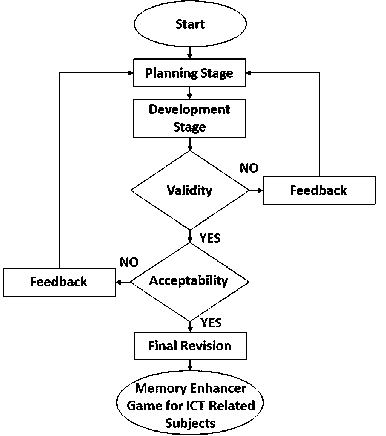
Fig.1. Research procedure
Final Revision Stage. After testing the system and measuring its validity and acceptability, opinions and suggestions from the validators and end users were integrated into the final revision of the GBL. Other suggestions not included in the final revision of MEG were included in the Recommendations of the study. negative, or neutral. The Word Art onlinebased word cloud generator website is also going to be used here to find the most frequently used words in the opinions. However, the flowchart of the proposed work in given above.
4. Data Analysis and Findings 4.1. Puzzle Game Type for MEG
The table below shows the preference of (9) respondents, the ICT teachers and SMEs on the puzzle game type(s) to be adapted for the MEG, which answers the first research question of this study. Traditional puzzle game type as well as non-conventional puzzle game types were included in the options.
Table 1. MEG puzzle game type
|
Criteria |
Category |
Frequency/Mean |
Percentage |
|
Simulation |
3 |
33 |
|
|
Strategy Game |
3 |
33 |
|
|
Puzzle Game Type |
Board Game |
2 |
22 |
|
Picture Puzzle |
1 |
11 |
|
|
Word Puzzle |
0 |
0 |
|
|
Strategy Game & Simulation |
4 |
44 |
|
|
Select 2 Puzzle Game Types to |
Board Game and Strategy Game |
3 |
33 |
|
combine in MEG |
Picture Puzzle & Simulation |
1 |
11 |
|
Board Game and Simulation |
1 |
11 |
The Puzzle Game type, based on the tabulated results, respondents prefer non-traditional puzzle game types in designing MEG GB-ITS, which are the Simulation and Strategy game types. It also shows an even distribution of votes of 3 each for Simulation and Strategy game types, earning the highest percentage of 33% among the options. Under 2 Puzzle Game Types to combine in MEG, the same as shown in the results of the ICT teachers and SMEs’ votes in their preference for which puzzle game types, they would wish to combine with the frequency of 4 out of 9 respondents, earning the highest percentage of 44%, were in favor with the combination of Simulation and Strategy puzzle game types the to be adapted in the development of the MEG system as shown in the figures below:
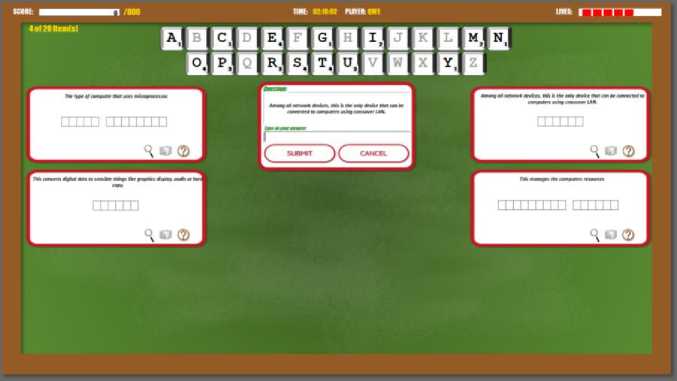
Fig.2. MEG’s strategy puzzle game
The MEG’s strategy puzzle game provides all needed letter tiles to complete all items in each round of a game. It is up to the player how to utilize these letter tiles to help them guess or spell-out items in each round. Each game under this game type can consist of a maximum of 20 items, with a minimum of 1 up to 4 items per round, depending on the available items for the player’s selected content to review, and game level difficulty played. All unused tiles per round will be converted to points which will be added to the player’s total score in the game.
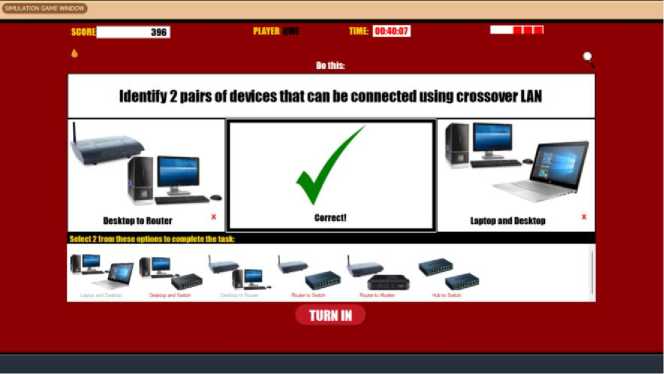
Fig.3. MEG’s simulation puzzle game
For MEG’s Simulation game, the student/player is given a set of choices to either complete a task or simply identify what is asked per round in a game. The player is required to pick 2 among the choices given, then the TURN IN button will be enabled. Once pressed, the game will give a video or image feedback, corresponding to the answer of the player. Each game under this game type could consist of a maximum of 20 items, again depending on the availability of items for the selected content the player chose to review, and the difficulty level he/she is currently playing.
-
4.2. MEG Game Design Features
This study also determined the game features adapted in the development of MEG system. Game Perspective, Design, Rewards, and Player’s Properties features to be adapted in MEG were determined from the result of the MEG Design questionnaire answered by the senior high school teachers of Calasiao Comprehensive National High School teaching core/ and specialized ICT subjects.
Table 2. MEG game design features
|
Criteria |
Category |
Mean |
Descriptive Equivalent |
|
Design Features |
|||
|
1. Important in gameplay |
|
5.00 4.78 4.78 4.78 4.67 4.67 |
Very Highly Preferred Very Highly Preferred Very Highly Preferred Very Highly Preferred Very Highly Preferred Very Highly Preferred |
|
2. Visual aesthetics |
c. Hyper-Realistic |
4.78 4.56 4.56 |
Very Highly Preferred Very Highly Preferred Very Highly Preferred |
|
3. Event notice |
|
4.89 4.89 4.67 |
Very Highly Preferred Very Highly Preferred Very Highly Preferred |
|
4. Game level difficulty determinants |
|
4.67 4.56 4.56 4.33 |
Very Highly Preferred Very Highly Preferred Very Highly Preferred Highly Preferred |
|
5. Labelling of player’s game levels |
a. Usual game level terms (Ex. Newbie, Rookie, Novice) b. Local or Filipino terms |
4.89 4.78 |
Very Highly Preferred Very Highly Preferred |
|
Weighted Mean |
4.71 |
Very Highly Preferred |
|
|
Game Perspective |
|||
|
1. Platform(s) to be used |
|
4.89 4.67 4.00 |
Very Highly Preferred Very Highly Preferred Highly Preferred |
|
2. Player’s Point of View |
c. Top Down (like in Plants vs Zombies and Mobile Legends)
|
4.78 4.67 4.00 |
Very Highly Preferred Very Highly Preferred Highly Preferred |
|
3. Game environment and controls |
|
5.00 4.67 4.67 |
Very Highly Preferred Very Highly Preferred Very Highly Preferred |
|
4. Game theme |
b. Horror |
4.89 4.89 4.78 4.33 4.33 3.11 |
Very Highly Preferred Very Highly Preferred Very Highly Preferred Highly Preferred Highly Preferred Moderately Preferred |
|
Weighted Mean |
4.51 |
Very Highly Preferred |
|
|
Game Rewards and Scores |
|||
|
1. Acceleration of player’s level with a dramatic increase of player’s gameplay scores. |
4.89 |
Very Highly Preferred |
|
|
2. Giving of tokens as rewards in gameplay |
4.89 |
Very Highly Preferred |
|
|
3. Promotion of player’s level based on collected tokens |
4.78 |
Very Highly Preferred |
|
|
4. Use tokens for purchase of tools, upgrades or extra controls/privileges |
4.78 |
Very Highly Preferred |
|
|
5. Enable teachers and administrators to view players’ game records. |
4.78 |
Very Highly Preferred |
|
|
6. Add restrictions on viewing user’s/players’ scores or data |
4.67 |
Very Highly Preferred |
|
|
7. Demotion of player’s level with consecutive decreases in player’s gameplay scores |
4.67 |
Very Highly Preferred |
|
b.2. Video or movie file in form of .MP4, .AVI b.1. Document file in form of PDF |
4.67 4.89 4.89 4.67 4.56 |
Very Highly Preferred Very Highly Preferred Very Highly Preferred Very Highly Preferred Very Highly Preferred |
|
|
Weighted Mean |
4.76 |
Very Highly Preferred |
|
|
Player’s Properties |
|||
|
1. Prefer multiplayer game |
4.89 |
Very Highly Preferred |
|
|
2. Select an avatar for gameplay |
4.89 |
Very Highly Preferred |
|
|
3. Evolution of player’s avatar |
4.89 |
Very Highly Preferred |
|
|
4. Show player’s rankings |
4.89 |
Very Highly Preferred |
|
|
5. Given multiple players lives as limits/chances for gameplay |
4.78 |
Very Highly Preferred |
|
|
6. Customize player’s avatar |
4.78 |
Very Highly Preferred |
|
|
7. Enable player to return to previous game levels already played |
4.44 |
Highly Preferred |
|
|
Weighted Mean |
4.79 |
Very Highly Preferred |
|
|
Overall Weighted Mean |
4.51 |
Very Highly Preferred |
|
Legend: Very Highly Preferred - 4.51 - 5.00, Highly Preferred - 3.51-4.50, Moderately Preferred 2.51 3.50, Slightly Preferred 1.51 2.50, Very Slightly Preferred 1.00 1.50
One of the features of MEG that categorized it under GB-ITS is its review interrupt, which integrates an on-screen or animated tutor/avatar was included based on the result of the respondents under Game Features – 2. Visual Aesthetics, providing the student response or feedback to answer he/she gives to interrupt questions during his/her review of his/her selected content. The MEG’s review interrupt will ask questions regarding the review material being reviewed by the student. The student is allowed to return to the review material when prompted by the review interrupt screen, and even switch off or on the review interrupt screen during a review. Once the student answers all interrupt questions correctly, the system then asks if the student would like to continue reviewing or is ready for an assessment in the form of a game, which the system will determine which game type the student should play, depending on the availability of game type items for the selected content the student reviewed.
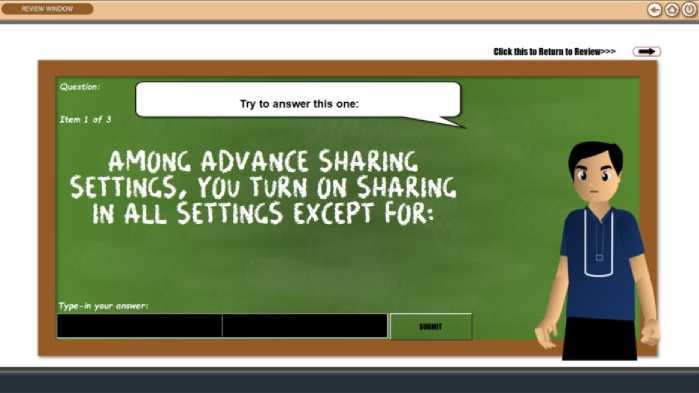
Fig.4. MEG’s review interrupt avatar
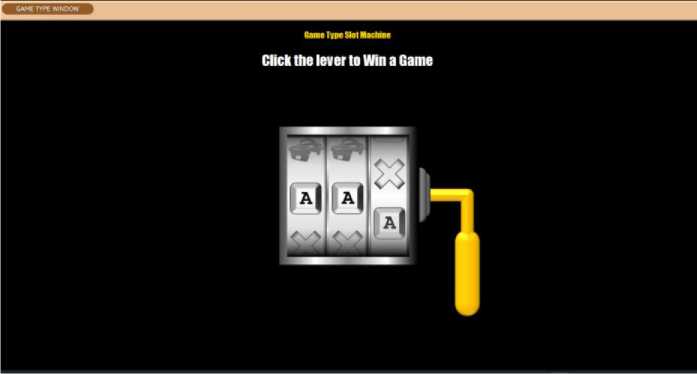
Fig.5. MEG’s game type slot machine
In response to the preference of the respondents under Game Perspective – 4. Game Theme, where Mystery scored highest along with Action/Adventure, the researcher added into the MEG system a feature using a slot machine, that randomly selects a puzzle game type the student should play after reviewing the content and answering all interrupt questions regarding it correctly. This feature was added to the system to make a non-predictable interaction with the system, preventing a routinary experience of students/players when interacting with an Intelligent Tutoring (ITS), which based on [24], causes players to lose interest in engaging further with the system with prolonged use.
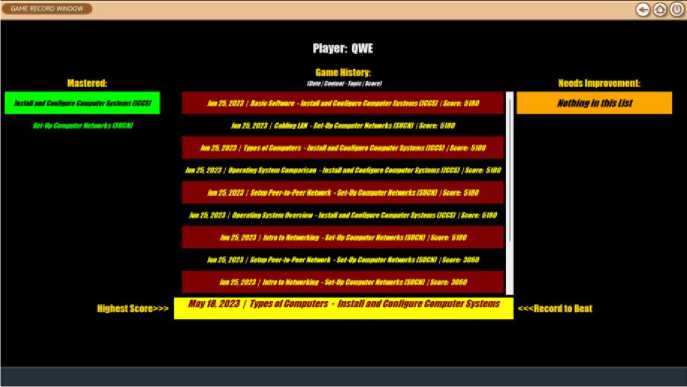
Fig.6. MEG’s game type slot machine
Another feature of MEG is its scoreboard or the Game record window, which enables the preferred game features by the respondents under Game Rewards and Scores – items (5) and (6), provides the players/students feedback to which content or skills they need to review and which competency or topic they have already mastered. This feature also provides intrinsic motivation to players to beat their own records or do better than other players, according to [20].
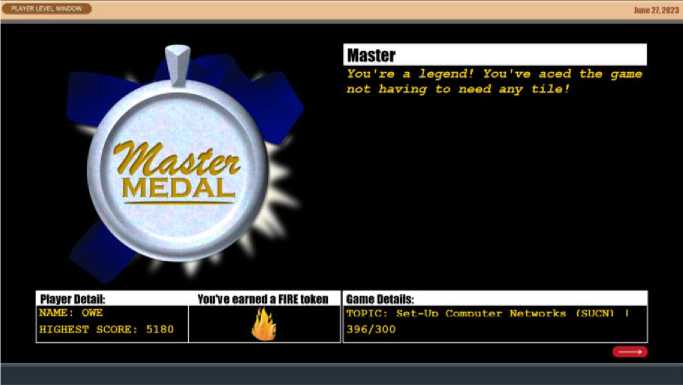
Fig.7. MEG’s player level window
MEG also gives tokens to players every time they score perfectly in a game based on the results of the MEG Design questionnaire, under Game Rewards and Scores – items 3 and 4, where the respondents preferred giving tokens as a reward during gameplay which can be used as game tools or privileges. There are two types of game tokens players can receive which they can use as additional tools or privileges during games. The Fire token can be used when playing a Simulation game, which burns 1 to 2 unnecessaries tiles or options for a game round. Another is the Ice token, which when used buys an additional 20 seconds for a player when playing a Strategy puzzle game.
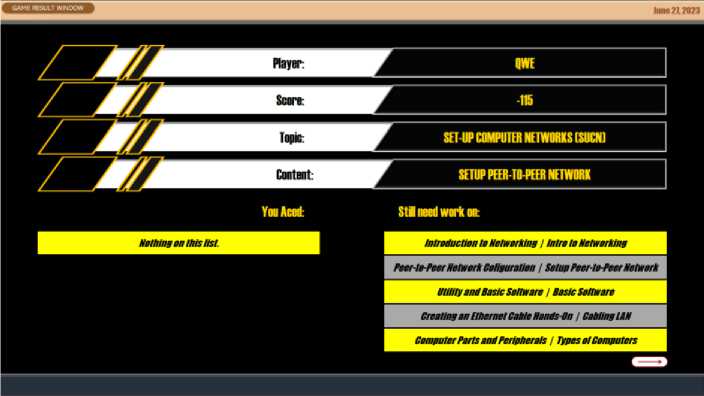
Fig.8. MEG’s game result window
Another feature of MEG is its Game Result window, in response to the preference of the respondents under Game Rewards and Scores – 8. Feedback and Suggestions based on scores, which provides players/students feedback regarding the game they played, which skill or content they still need to review, and which content or skill they have mastered.
Again, in response to the preference of the respondents under Game Rewards and Scores – 8. Feedback and Suggestions based on scores – A., players are provided with topics that contain subtopics under them, and each subtopic can contain a list of contents the player can choose from. Each topic or subtopic is easily recognized with icons. Subtopics with contents that are already mastered by players are colored gold, just as the “Peer-to-Peer Network Configuration” button shown in the figure above, indicates it was already mastered by the player.
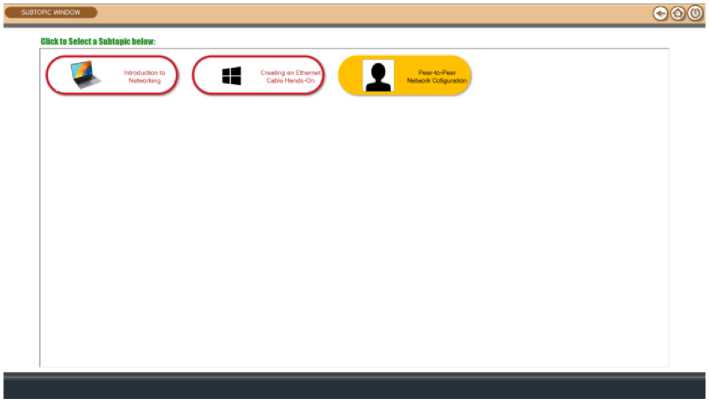
Fig.9. MEG’s Topic/subtopic window
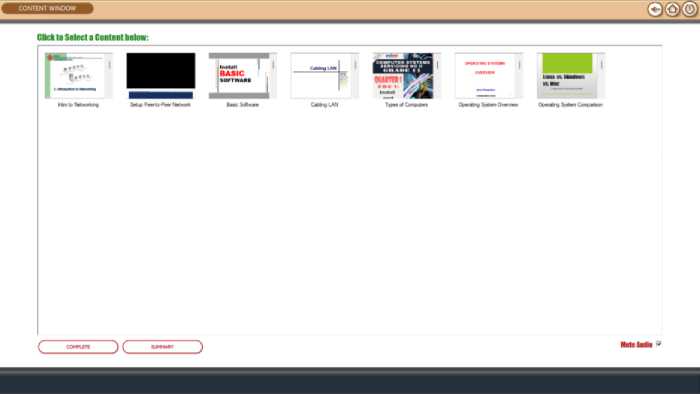
Fig.10. MEG’s content window
Students can choose subtopic(s) under a selected topic, which could contain a number of contents in both video and PDF files, depending on the availability of contents per subtopic, in response to the preference of the respondents under Game Rewards and Scores – 8. Feedback and Suggestions based on scores.
-
4.3. Level of Validity of MEG
-
4.4. Level of Acceptability of MEG
After developing the MEG system based on the result of the MEG Design Questionnaire, the next this study checked its validity as a GB-ITS, which was first tested with ICT-related subjects by (8) ICT Professors, SMEs, and teachers from universities and high schools in Dagupan City and Schools Division I of Pangasinan. The MEG system’s validity was checked with regard to its design, accuracy, navigation, and usability.
The MEG was rated Very Highly Valid in all aspects, though still lacks some features with the ICT teacher and SME validators indicated in the recommendations of the MEG’s validity questionnaire, namely adding a batch processing of items of games, zoom feature, and modality or dubbing of contents and game items for students or player with eye impairments, request for change of player’s basic information, and improvement or adding of more aesthetic design and audio score to MEG.
Table 3. Validity of MEG
|
Criteria |
Mean |
Descriptive Equivalent |
|
MEG’s Design |
||
|
1. The game design follows a consistent concept of game theme |
4.67 |
Very Highly Valid |
|
2. The game design is appropriate to the grade level of its intended players or users |
4.44 |
Very Highly Valid |
|
3. The game design is stylish, and its aesthetic design and audio score is not overdone. |
4.44 |
Highly Valid |
|
Weighted Mean |
4.52 |
Very Highly Valid |
|
MEG’s Accuracy |
||
|
1. User’s data are not confused with other user’s game play records and data. |
4.89 |
Very Highly Valid |
|
2. User’s access control depends on the user role. (Ex. Admin can access all other accounts, and students are restricted from quiz/game items modification, addition and deletion.) |
4.77 |
Very Highly Valid |
|
3. The system’s suggested subject content competencies to be reviewed correspond to the mistakes the player committed during game play |
4.67 |
Very Highly Valid |
|
4. The scores and feedback generated after every game play correctly reflects the player’s performance during game play. |
4.44 |
Very Highly Valid |
|
5. The visual aesthetics and audio score directly reflect the actual events during game play. |
4.33 |
Highly Valid |
|
Weighted Mean |
4.60 |
Very Highly Valid |
|
MEG’s Navigation/Controls |
||
|
1. Game controls are given sufficient instructions for use |
4.89 |
Very Highly Valid |
|
2. Game controls are not confusing to use and are easily maneuvered |
4.67 |
Very Highly Valid |
|
3. Game controls are appropriate for the level of the intended end users |
4.44 |
Highly Valid |
|
4. Menus are easily understood and are not confusing. |
4.33 |
Highly Valid |
|
Weighted Mean |
4.58 |
Very Highly Valid |
|
MEG’s Usability |
||
|
1. The learning content of the Memory Enhancer Games can be updated based on the learners’ needs and curriculum requirements. |
4.99 |
Very Highly Valid |
|
2. The Memory Enhancer Games is appropriate for delivery of any ICT-related subjects. |
4.99 |
Very Highly Valid |
|
3. Students/Players of Memory Enhancer Games can easily track their record and access available learning resources integrated in it. |
4.99 |
Very Highly Valid |
|
4. The Memory Enhancer Games are appropriate for learning ICT-related subjects. |
4.78 |
Very Highly Valid |
|
5. The system provides reliable information for teachers to evaluate student’s performance and level of knowledge with regards to contents or competencies learned |
4.67 |
Very Highly Valid |
|
6. The system is an effective alternative ICT learning content remedial tool |
4.44 |
Highly Valid |
|
Weighted Mean |
4.78 |
Very Highly Valid |
|
Overall Weighted Mean |
4.62 |
Very Highly Valid |
Legend: Very Highly Valid - 4.51 - 5.00, Highly Valid - 3.51-4.50, Moderately Valid - 2.51-3.50, Slightly Valid - 1.51-2.50, Ven Slightly Valid - 1.00 1.50
After revising the MEG system based on the recommendations from its validators and the result of the Validity test, the MEG was tested by (100) students who served as its end users, which was composed of two classes, a class of STEM Grade 11 students taking up Empowerment Technologies for the ICT core subject, and a class of TVL-ICT Grade 11 students taking up Computer Systems Servicing to test MEG on a specialized ICT subject. The results tabulated are shown in Table 4 below:
Table 4. Acceptability of MEG
|
Criteria |
Mean |
Descriptive Equivalent |
|
Preference of Using MEG |
||
|
1. I find the MEG more engaging compared with traditional way of learning ICT-related contents |
4.31 |
Highly Acceptable |
|
3. I prefer using this for learning ICT related learning contents than with other computer-aided instruction tools |
4.03 |
Highly Acceptable |
|
2. I can play this game for more than a week |
3.61 |
Highly Acceptable |
|
Weighted Mean |
3.98 |
Highly Acceptable |
|
MEG’s Suggestions and Feedback |
||
|
1. The scores and feedback generated after my gameplay correctly reflect my performance during gameplay. |
4.27 |
Highly Acceptable |
|
2. The system’s suggested learning content/competency for my review correctly reveals my mistakes and difficulties during gameplay. |
4.14 |
Highly Acceptable |
|
3. The visual aesthetics and audio score directly reflect the actual events during my gameplay. |
3.97 |
Highly Acceptable |
|
4. My user data are not confused with other user’s gameplay records and data upon MEG login |
3.85 |
Highly Acceptable |
|
Weighted Mean |
4.06 |
Highly Acceptable |
|
MEG’s Difficulty of Game Levels |
||
|
1. There is a distinction in each game level that makes me want to move higher |
4.23 |
Highly Acceptable |
|
2. The game levels are appropriate for my grade level |
4.14 |
Highly Acceptable |
|
3. The starting levels of the game have appropriate difficulty and ease. |
4.00 |
Highly Acceptable |
|
4. I am still engaged in playing the MEG even during advanced game levels |
3.79 |
Highly Acceptable |
|
5. I do not find the games too easy and has enough challenge to keep me playing till the final level. |
3.76 |
Highly Acceptable |
|
Weighted Mean |
3.98 |
Highly Acceptable |
|
MEG’s Visual Aesthetic Design |
||
|
1. I like the game design |
4.24 |
Highly Acceptable |
|
2. The game environment directly responds to each of my game interactions |
4.15 |
Highly Acceptable |
|
3. Menus are easily understood and are not confusing. |
4.01 |
Highly Acceptable |
|
4. I do not wish to add some more visual effects/design to the game |
3.24 |
Moderately Acceptable |
|
Weighted Mean |
3.91 |
Highly Acceptable |
|
MEG’s Content Design |
||
|
1. The Memory Enhancer Games are appropriate for learning ICT-related subjects. |
4.23 |
Highly Acceptable |
|
2. The system provides reliable information for teachers to evaluate my performance and level of knowledge with regards to contents or competencies learned |
4.22 |
Highly Acceptable |
|
3. The use of MEG is effective for gaining mastery or retention of learning contents or topics imported in it. |
4.16 |
Highly Acceptable |
|
4. The system is an effective alternative ICT learning content remedial tool |
4.12 |
Highly Acceptable |
|
5. Using Memory Enhancer Games, I can easily track my record and access available learning resources integrated in it. |
4.08 |
Highly Acceptable |
|
6. The learning content of the Memory Enhancer Games could be updated based on my needs, as learner/player and the curriculum requirements. |
4.06 |
Highly Acceptable |
|
7. The Memory Enhancer Games is appropriate for delivery of any ICT-related subjects. |
3.92 |
Highly Acceptable |
|
8. There are sufficient types of learning content presentation formats integrated in MEG that I can choose from and prefer learning/reviewing with. |
3.86 |
Highly Acceptable |
|
Weighted Mean |
4.08 |
Highly Acceptable |
|
Overall Weighted Mean |
4.02 |
Highly Acceptable |
Legend: Very Highly Acceptable - 4.51 - 5.00, Highly Acceptable - 3.51 4.50, Moderately Acceptable - 2.51-3.50, Slightly Acceptable - 1.51-2.50, Very Slightly Acceptable -1.00-1.50
Based on the results of the MEG’s Acceptability questionnaire, the MEG was rated Highly Acceptable with the overall computed weighted mean of 4.02, yet still needs some improvements to its features to be considered very highly acceptable, namely aesthetic design, content formats that can be imported into it, game difficulty level or challenge, and audio score.
5. Conclusion and Discussion
This study’s primary objective is to develop a memory enhancer game system in a form of a GB-ITS. It was identified that puzzle game type best enhances memory, so the study proceeded to include choices of puzzle game types to the MEG design questionnaire, in which the majority of the respondents chose strategy and simulation puzzle game types which both earned 33% among the choices. The game feature to be adapted in MEG was also identified through this game design questionnaire.
After the development of the first version of MEG, the system was validated by ICT teachers and instructors from Schools Division 1 of Pangasinan and a university in Dagupan City, which resulted in MEG being rated as Very Highly Valid in all aspects yet lacking some features which the validators indicated in the recommendations section of the validity questionnaire. Some of the features recommended by the validators were included in the second revision of MEG, namely, the zoom feature for students with eye impairments, and the request for changing players/students’ basic information.
The second revision of MEG was then BETA tested by (100) students, which was comprised of 2 classes of senior high school students, 1 class taking up an ICT core subject, and another class taking up a specialized ICT subject. The results of the acceptability questionnaire show that the MEG was already Highly Acceptable in all of the given aspects, yet still needs improvements with regard to its aesthetic design, audio score, and game-level difficulty.
Adding topic and subtopic icon features was also included in the final revision of MEG, the game difficulty was also improved as discussed in the description of the strategy puzzle game type on page 5.
Still, the researcher failed to include all the recommended features indicated in the results of validity and acceptability questionnaires. The features which the researcher or other researchers who desire to continue developing MEG should include the following: (1) modality or text dubbing, (2) batch processing of game items, (3) game score to be converted to coin to allow purchasing of in-game tokens, (4) inclusion and customization of player’s avatar, enabling coins to purchase avatar’s accessories, and (5) game narration.
Other recommendations by the researcher are to develop a puzzle game type combining strategy and simulation puzzle game types for the MEG only adapted these puzzle game types separately, improve and add more aesthetic design to MEG, and conduct experimental research to measure MEG’s effectiveness as a general-purpose memory enhancer game GB-ITS.
Other features of the MEG which make it a general-purpose Game-Based Intelligent Tutoring System are as follows:
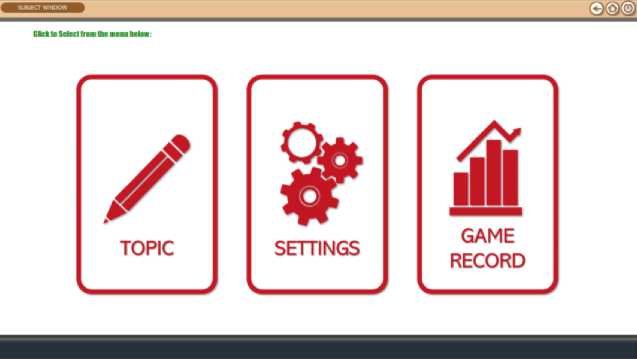
-
Fig.11. MEG’s main menu
Players are given these 3 options upon selecting a subject they want to review. The Topic option leads to a list of topics/competencies under the selected subjects, and each topic/competency contains a list of subtopics, under which are also available contents to review. The Settings option leads to 2 tabs for player account settings. A player can request for a change or correction of his/her basic information and change his/her MEG account password. The Game record options led to the Game Record window as shown in Figure 6.

COMPUTER SYSTEMS SERU1CIMG
EMPOWERMENT TECHNOLOGIES
MEDIA AND INFORMATION LITERACY
-
Fig.12. MEG’s subject menu
Another feature of MEG is enabling administrators and teachers to add subjects to the system. Under each subject added to MEG, teachers, and administrators can add topics, subtopics, and contents, and review interrupt and game items.
The findings of this study contribute to the development of a possible effective alternative for the remediation and Learning of ICT subjects, as well as a temporary solution for the lack of computers. This can also contribute to any future study to test whether a general-purpose GBL or GB-ITS model would compare; if it will not equal the effectiveness of GBLs designed for delivering specific contents or subjects. Empirical-wise, the system developed in this study can be used for testing the instructional efficacy of game features that will be adapted in the proposed system.
Список литературы Memory Enhancer Games: A General-purpose Game-based Intelligent Tutoring System
- National Academy of Sciences, 2018. Learning Is a Complex and Active Process That Occurs Throughout the Life Span, New Report Says. The National Academies of Sciences, Engineering, And Medicine. https://www.nationalacademies.org/news/2018/10/learning-is-a-complex-and-active-process-that-occurs-throughout-the-life-span-new-report-says
- Weselby, C., 2022. What is Differentiated Instruction? Examples of How to Differentiate Instruction in the Classroom. https://resilienteducator.com/classroom-resources/examples-of-differentiated-instruction/
- Nickow, A., Oreopoulos, P., Quan, V., 2020. The Impressive Effects of Tutoring on PreK-12 Learning: A Systematic Review and Meta-Analysis of the Experimental Evidence. National Bureau of Economic Research. DOI 10.3386/w27476
- Robinson, C. D., Kraft, M. A., Loeb, S., and Schueler, B.E., 2021. Accelerating Student Learning with High-Dosage Tutoring. EdResearch for Recovery, Design Principles Series. https://eric.ed.gov/?id=ED613847
- Almasri, A., Ahmed, A., Al-Masri, A., Sultan, Y. A., Muhmoud, A. Y., Zaqout, I., Akkila, A. N., Abu-Naser S. S., 2019. Intelligent Tutoring Systems Survey for the Period 2000- 2018. International Journal of Academic Engineering Research, Volume 3, Issue 5, pp. 21-37
- Alkhatlan, A., and Kalita, J. 2018. Intelligent Tutoring Systems: A Comprehensive Historical Survey with Recent Developments. ArXiv, abs/1812.09628.
- Plass, J. L., Mayer, R., Homer, B., & Kinzer, C. K., 2020. Theoretical Foundations of Game-Based and Playful Leaning. Handbook of Game-Based Learning. pp. 344-707.
- Raut, U. S. D. Agashe, U. Farheen & A. Anwari (2015) Game Based Intelligent Tutoring System. International Journal of Engineering Research and General Science, 3(2), pp. 2091-2730.
- Agoncillo, J. A., 2023. DepEd Laments Dearth of Devices. Philippine Daily Inquirer, https://newsinfo.inquirer.net/1317951/deped-laments-dearth-of-devices
- Magsambol, B., 2020. Philippines Eyes better Ranking in 2022 International Student Assessment Program. Rappler.com. https://www.rappler.com/nation/philippines-to-join-programme-international-student-assessment-2022/
- Leaño, A. J., Rabi, N. M., and Piragasam, G. A. G., 2019. Speaking difficulties of Philippine indigenous learners in English Phonology. International Journal Academic Research Business and Social Sciences, 9(1), pp. 1231–1244.
- de Ramos-Samala, H., 2017. Spiral Progression Approach in Teaching Science: A Case Study. KnE Social Sciences, 4th International Research Conference on Higher Education, pp.555–567.
- Silao, Jr. I.V., 2018. Factors Affecting the Mathematics Problem Solving Skills of Filipino Pupils: A Study Conducted in Kiamba Central School SPED Center, Kiamba, Sarangani. International Journal of Scientific and Research Publications, Volume 8, Issue 2, pp. 487-497.
- Abdul Gafoor, K. and Kurukkan, A., 2015. Learner and Teacher Perception on Difficulties in Learning and Teaching Mathematics: Some Implications. https://files.eric.ed.gov/fulltext/ED568368.pdf
- Goker, H., and Tekedere, H., 2022. Phubbing, Alienation, Digital Game Addiction, Independent Self-Construal, And Interdependent Self-Construal Among High School Students: A Path Analysis. Behavioral Psychology / Psicología Conductual, Vol. 30, Nº 1, 2022, pp. 157-181.
- Learningplunge.com, 2017. 4 BENEFITS OF GAME-BASED LEARNING, https://www.learningplunge.org/2017/09/27/4-benefits-of-game-based-learning/
- Sivakumar, R., 2022. Effectiveness of Memory Games on Academic Performance of Primary School Students. Global and Lokal Distance Education- GLOKALde, pp18-23.
- Kinzer, C. K., Hwang, M., Chantes, P., Choi, A., and Hsu. S., 2015. Educational games: Insights for acceptance. GLS 11 conference proceedings. Pittsburgh, PA: ETC Press
- Plass, J. L., and Homer, B. D., 2012. Popular game mechanics as games inspirations for learning mechanics and assessment mechanics. Paper presented at the Game Developers Conference, San Francisco, CA
- Kinzer, C. K., Hoffman, D., Turkay, S., Gunbas, N., Chantes, P., Dvorkin,T., and Chaiwinij, A., 2012. The impact of choice and feedback on learning, motivation, and performance in an educational video game. In K. Squire, C. Martin, & A. Ochsner (Eds.), Proceedings of the games, learning, and society conference: Vol. 2 (pp. 175–181). Pittsburgh, PA: ETC Press.
- Willis, J., 2010. Learning to love math: teaching strategies that change student attitudes and get results. Alexandra, VA: ASCD.
- Plass, J. L., Homer, B. D. and Kinzer, C. K., 2015. Foundations of Game-Based Learning. Educational Psychologist, 50(4), pp. 258-283.
- Funbrain.com, 2017. https://www.funbrain.com/about.
- Snow, E. L., Jacovina, M. E., Jackson, G. T., and McNamara, D. S., 2016. iSTART-2: A reading comprehension and strategy instruction tutor. In S. A. Crossley & D.S. McNamara (Eds.) Adaptive educational technologies for literacy instruction (pp.104-121). New York: Taylor & Francis.
- Red, E. R., Domingo, K. E. D., Santos, K.M. F. and Banaag, J. T., 2013. Design and Development of a Mobile Game-Based Learning Application in Synonyms, Antonyms, and Homonyms. International Journal of the Computer, the Internet and Management Vol.21 No.3, pp 32-38.
- Kahoot!, 2013. https://kahoot.com/company/.
- Andersen, E., 2012. Optimizing adaptivity in educational games. In Proceedings of the International Conference on the Foundations of Digital Games, pp. 279–281. New York, NY: ACM.
- Turkay, S., & Kinzer, C. K., 2013. The effects of customization on game experiences of a massively multiplayer online game’s players. In C. Williams, A. Ochsner, J. Dietmeier, & C. Steinkuehler, (Eds.), Proceedings of GLS 9.0: Games C Learning C Society Conference (pp. 330–337). Pittsburgh, PA: ETC Press.
- Azevedo, R., Cromley, J. G., Moos, D. C., Greene, J. A., and Winters, F. I., 2011. Adaptive content and process scaffolding: A key to facilitating students’ self-regulated learning with hypermedia. Psychological Testing and Assessment Modeling, 53, pp. 106–140.
- Olsson, M. and Mozelius,P., 2016. Game-Based Learning and Game Construction as an E-Learning Strategy In Programming Education, https://digitaluniversities.guideassociation.org/wp-content/uploads/2016_2_3_04_Olsson.pdf.
- Rahman, A. A., Najmuddin, A. F., Abdullah, M. F., Ibrahim, I. M., Shaffie, S. S., & Ismail, S. R., 2020. The Development of Atomic Game-Based Learning for Chemistry. International Journal of Academic Research in Business and Social Sciences, 10(11), pp. 1364–1372.
- Obedoza, J. B. and Sison, R., 2020. Design of a Game-based Intelligent Learning Environment to Remediate Fraction Addition/Subtraction Misconceptions. Proceedings of the 28th International Conference on Computers in Education.
- Dando, M. F., De Guzman, P. K., Tampos, E. and Balahadia, F., 2019. First Aid Mobile Application for University Clinic using Predictive String Search Algorithm, 2019 IEEE 11th International Conference on Humanoid, Nanotechnology, Information Technology, Communication and Control, Environment, and Management (HNICEM), pp. 1-6.
- Whitton, N., 2012. “The place of game-based learning in an age of austerity” Electronic Journal of e-Learning, 10(2), pp. 249 – 256.
- Perry, D., 2016. An Analysis of Game-Based Learning for the Design of Digital Science Games. The University of Washington https://digital.lib.washington.edu/researchworks/bitstream/handle/1773/35505/Perry_washington_0250E_15455.pdf?sequence=1
- Shabaneh, Y., & Farrah, M., 2019. The effect of games on vocabulary retention. Indonesian Journal of Learning and Instruction, 2(1), pp. 79-90. https://journal.uniku.ac.id/index.php/IJLI/article/view/1687
- Zirawaga, V. S., Olusanya, A. I. & Maduku, T., 2017. Gaming in Education: Using Games as a Support Tool to Teach History, Journal of Education and Practice, 8(15), pp. 55-64, https://www.researchgate.net/publication/321376822_Gaming_in_Education_Using_Games_as_a_Support_Tool_to_Teach_History
- Dol, S. M., 2017. GPBL: An Effective way to Improve Critical Thinking and Problem-Solving skills in Engineering Education, Journal of Engineering Education Transformations, 30(3), http://www.journaleet.org/index.php/jeet/article/view/110523
- Bahrami, F., Chegini, Z. R., Kianzadeh, A., Emami, F. & Abdi, H., 2012. A comparison of the effectiveness of game-based and traditional teaching on learning and retention of first-grade math concepts, European Journal of Experimental Biology, 2 (6): pp. 2099-2102, http://www.imedpub.com/articles/a-comparison-of-the-effectiveness-of-gamebased-and-traditional-teaching-onlearning-and-retention-of-first-grade-math-concepts.pdf
- Liu, Eric Zhi Feng & Chen, Po-Kuang, 2013. The Effect of Game-Based Learning on Students’ Learning Performance in Science Learning – A Case of “Conveyance Go”, November 2013, Procedia - Social and Behavioral Sciences 103(4): pp. 1044-1051. DOI:10.1016/j.sbspro.2013.10.430
- Su, C.H. & Cheng, C.H, 2013. A Mobile Game-based Insect Learning System for improving learning achievements. Procedia - Social and Behavioral Sciences, Volume 103, pp. 42-50. https://reader.elsevier.com/reader/sd/pii/S1877042813037506?token=6BABB6D6FC9146803C5930EE76373B8B390EA0205641A814C43E007231754966E960E7049DC5E482EE64D24CE5A47016
- Ong, A.A. D., Tecson, R. M. V. & Danseco, B. M. P., 2014. Developing an Educational Augmented Reality Game on the Battle of Mactan Using the Intel Perceptual Computing Kit, http://penoy.admu.edu.ph/~alls/wp-content/uploads/2014/12/Paper-05-FINAL.pdf.
- Prikken, M., Konings, M. J., Lei, W. U., Begemann, M. J. H., & Sommer, I. E., 2019. The efficacy of computerized cognitive drill and practice training for patients with a schizophrenia-spectrum disorder: A meta-analysis. Schizophrenia Research, Volume 204, pp. 368-374, https://doi.org/10.1016/j.schres.2018.07.034

